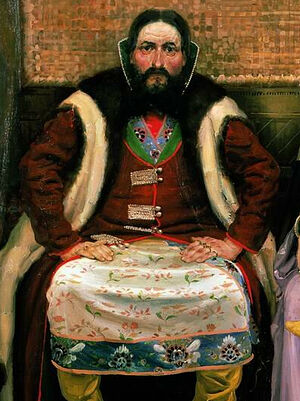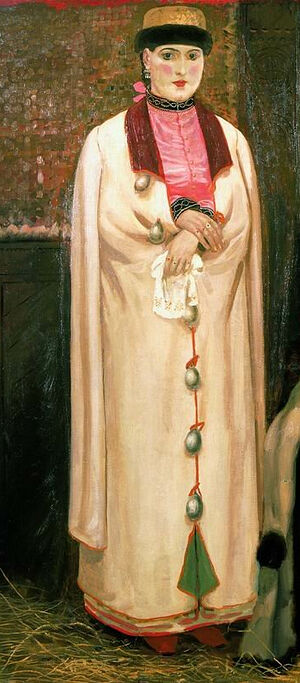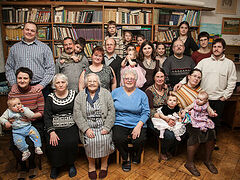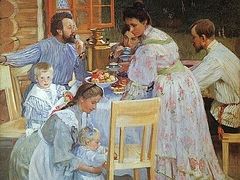It seems logical to think that the idea of a wife’s obedience to her husband became completely outdated before the twenty-first century. And it’s not simply outdated—it’s obvious that a wife’s obedience is a destructive force to the family as a whole, it destroys the personality of the woman and inevitably the personality of the husband himself. How can anyone take it as a norm when a despotic abuser a.k.a. husband orders his wife around as if she were his dog, a slave, or a soldier? As in, “I said do it, right now!” Can there be a healthy relationship based on the humiliation of the wife? The children will see how their father devaluing their mother—how can this promote harmonious development for both the sons and daughters? To support her husband’s brutal aggression, to endure beatings in the name of obedience—means nothing more than allowing real violence, both psychological and physical, in her home! How can it be Christian, or even simply human, not only to accept such ideas, but even to preach them?!
Everyone is talking about it: bloggers, all self-respecting and highly respected journalists, activists, or defenders of rights and freedoms and a whole bunch of other very important things. Without belittling the merits of all these fighters against domestic violence, let’s pay attention to the following fundamentally important issue: The approach we’ve just described reveals the wonderful effect of “framing a question”1 famously described by the Nobel Prize laureate Kahneman. We announce a certain topic that we absolutely do not understand (or that we do not want to understand) as if it were another idea that we really know well or that we truly care about. Whether it’s done purposefully or unintentionally, by putting an equal sign between two incomparable ideas, we declare it a discussion about the first one—but in reality we are discussing the second one. In our case, we are putting an “equal” sign between “a wife’s obedience to her husband” and “domestic violence/abuse of women.” In this way, instead of discussing the Orthodox doctrine of hierarchy in the family, we discuss violence or humiliation. To put it mildly, in an attempt to avoid “strong language,”—this substitution is incorrect.
What is the meaning of the Christian commandments on roles in marriage?
The assignment of responsibilities in a Christian family begins with the following concept: The value and purpose of marriage is love, harmony, and like-mindedness of the spouses. The great teacher of the whole world and the Holy Hierarch John Chrysostom spoke about this on many occasions. The prayer on like-mindedness between spouses is the only reference to the family in a liturgy (the Anaphora Prayer of the Holy Hierarch Basil the Great). Everything in the teaching on the family—and, by extension, in the teaching on the relationship between Christians in general—speaks of mutual love, mutual respect, and the service of the one to another.
However, in addition to general Christian goals, marriage also has specific purposeful roles.
About the husband
 A husband should love his wife, “even as Christ also loved the church and gave Himself for it” (Ephesians 5:25-33). The husband’s love for his wife is his primary “responsibility,” nothing less than his obligation as a Christian. The measure of love is the highest possible in this world and the next—to love “as Christ loved,” even unto death. It isn’t just a matter of expressing sublime and lofty love, but also simply to show love, to enshroud his wife with warm care:
A husband should love his wife, “even as Christ also loved the church and gave Himself for it” (Ephesians 5:25-33). The husband’s love for his wife is his primary “responsibility,” nothing less than his obligation as a Christian. The measure of love is the highest possible in this world and the next—to love “as Christ loved,” even unto death. It isn’t just a matter of expressing sublime and lofty love, but also simply to show love, to enshroud his wife with warm care:
So ought men to love their wives as their own bodies. He that loveth his wife loveth himself. For no man ever yet hated his own flesh; but nourisheth and cherisheth it, even as the Lord the church (Eph. 5:28-29).
This care and responsibility of the husband for his wife is expressed in a unique manner: That the head of every man is Christ; and the head of the woman is the man (1 Cor. 11:3). As always and everywhere in the Christian teaching, the greater the authority, the greater the responsibility. The husband as the head is the one who receives these commandments; they are about love and “principal care for his household, “the prosperity of family life, and care for the family members.2
In Christianity, being in command is a unique kind of service, and it means imitating Christ Himself, requiring the family’s head to possess a special kind of wisdom
In Christianity, being in command is a unique kind of service, meaning the imitation Christ himself; it requires the head of a family to possess a special kind of wisdom, that same loving attention to the ones entrusted in his care, and genuine humility. Respect for those under your command, the ability to “exalt the privilege of your dependents”—this is a markedly typical characteristic of a Christian head of family, but more than anything, it is an inherent quality of a Christian husband’s attitude toward his wife:
“But the woman is insolent,” says he. Consider nevertheless that she is a woman, the weaker vessel, whereas you are a man. For therefore were you ordained to be ruler; and were assigned to her in place of a head, that you might bear with the weakness of her that is set under you. Make then your rule glorious. And glorious it will be when the subject of it meets with no dishonor from you. And as the monarch will appear so much the more dignified, as he manifests more dignity in the officer under him; but if he dishonor and depreciate the greatness of that rank, he is indirectly cutting off no small portion of his own glory likewise: so also thou dishonor her who governs next to yourself, will in no common degree mar the honor of your governance,”3 the Holy Hierarch John Chrysostom writes.
There is not a shadow of humiliation or “tyranny” in the Christian teaching of the husband’s command over his wife, but instead, there is—and should be!—much love, gentleness, and respect:
“And again, never call her simply by her name, but with terms of endearment, with honor, with much love. Honor her, and she will not need honor from others; she will not want the glory that comes from others, if she enjoys that which comes from you. Prefer her before all, on every account, both for her beauty and her discernment, and praise her,”4 continued the Ecumenical Hierarch.
Three kinds of marital love
In Russian, love means just that, “love,” but in Greek, the language of theology, the language used in all the fundamental texts of the Holy Scripture that have come down to us, the word “love” will have several different connotations. And they are not just different words—they explain different kinds of relationships. The true value here is what specific kind of love St. John Chrysostom urges a husband to have for his wife—the kind of love in a Christian marriage:
-
ἀγάπη (agape)—love as being of service to someone, the “loftiest” kind of love. It is how God loves man, the “love one another” kind of love all of us are called to as Christians. This kind of love is the direct commandment and obligation the Apostle has left to the husbands: “Husbands, love (ἀγαπᾶτε) your wives” (Ephesians 5:25). This is the task assigned to both spouses: The apostle, says John Chrysostom, “suggested that husband and wife have... mutual love (τῆς ἀγάπης) and attentiveness.”5 When he speaks about marriage as “a sacrament of love (ἀγάπης μυστήριον),” it also specifically means this particular lofty, sublime, truly Christian and perfect love.
-
φιλία (filía) is love-friendship. Love-friendship has affection, respect, and, along with the stated and clearly expressed superiority of a husband, it is declared to have equality. When St. John Chrysostom speaks about the family where Christ dwells Himself, that is, a truly Christian family, the holy hierarch specifically singles out filía, or love-friendship between all the family members, as a condition of such happy and lofty family status: “where husband and wife and children, in harmony and love (φιλία), are united with bonds of virtue, Christ is in their midst.”6 In the event the husband is happily married, that is, he has the good fortune of having a good wife, or even if he had bad luck with her, that is, “if she is unchaste, neglecting and despising you,” St. John Chrysostom exhorts the husband to “inspire” his wife exclusively “with great care about her, love and friendship (τῇ φιλίᾳ). There are no bonds stronger than these, especially for husband and wife.”7
-
ἔρως (eros) means being in love. This romantic kind of love, when the husband loves his wife not only as his “sister in Christ,” not only as his best friend, but also specifically as a woman, is also repeatedly mentioned by the holy fathers as they speak about marriage. For example, according to one and the same John Chrysostom, “nothing invigorates our life more than the love (ἔρως) between husband and wife.”8
About the wife
 To a great extent, anything the Christian teaching on family prescribes for the husband is also prescribed for the wife. Both are to seek agreement of opinions and harmony, to be of service and friends to one another, and treat one another with kindness. But a unique feature of the wife’s role is the emphatic respect for her husband. The apostle gave this command to married women: Wives, submit yourselves unto your own husbands, as unto the Lord. For the husband is the head of the wife, even as Christ is the head of the church (Eph. 5:22-23). A more severe and intimidating formula follows: And let the wife fear her husband (Eph. 5:33).
To a great extent, anything the Christian teaching on family prescribes for the husband is also prescribed for the wife. Both are to seek agreement of opinions and harmony, to be of service and friends to one another, and treat one another with kindness. But a unique feature of the wife’s role is the emphatic respect for her husband. The apostle gave this command to married women: Wives, submit yourselves unto your own husbands, as unto the Lord. For the husband is the head of the wife, even as Christ is the head of the church (Eph. 5:22-23). A more severe and intimidating formula follows: And let the wife fear her husband (Eph. 5:33).
These are not just the words you can’t knock out of a song. They are an integral component of Christian teaching in general, and the teaching about the family in particular. To think of all of this as obsolete or irrelevant is the same as reexamining the teaching of the New Testament and the Fathers of the Church in their entirety. It also means to no longer self-identifying as Christians.
When the Holy Hierarch John Chrysostom explains the idea of the wife’s obedience to her husband, he points out that the major role in the wife’s obedience is assigned to... God Himself. The wife must obey her husband “not for the husband’s sake, yet primarily for the Lord’s sake.”9 Incidentally, this also explains an extraordinary, or even frightful, appeal by the Savior to leave your husband or wife and follow Christ. The Holy Hierarch John Chrysostom suggests that this “abandonment” is about fulfillment of your Christian duties towards the spouse, not so much for the sake of the spouse, but for the sake of God, meaning: A husband must love his wife, and the wife must obey her husband for the sake of Christ, in this way, by fulfilling the duty towards your spouse—which is to serve God.
A wife’s obedience to her husband is a way to achieve harmony and like-mindedness at home
A wife’s obedience to her husband is one of the ways to achieve harmony and like-mindedness at home. This perspective is the rationale and hallmark of the ideal of a wife’s obedience to her husband. St. John Chrysostom speaks about it: “And Paul would never without a reason and without an object have spent so much pains on this subject, as when he says here, “Wives, be in subjection unto your own husbands, as unto the Lord.” And why is this so? Because, “if they are of one mind, their children are brought up well... But if it be otherwise, all is turned upside down.”10
Therefore, if harmony in the family is achieved through the wife’s obedience to her husband, then the refusal to be in obedience destroys that harmony and the “traditional family” itself. This is not only the basis of the Christian view on family, but also genuine historical experience. The great Russian philosopher Ivan Alexandrovich Ilyin wrote about this in his policy essay, “On the Destruction of Family in the Soviet State,” where he plausibly and successively laid out how exactly such destruction had occurred before and continues to occur today.11 Ilyin has pointed out that the cornerstone of the “sacred dogma” of communism, which gradually became a reality, lies in the denial that “a woman can belong to a man,” in the perception that the traditional Christian family is “a hideous bourgeois cage or prison,” and in the belief that the “religious prejudices” are at the very core of the said enslavement of women.
I suggest that we don’t dwell on this important and interesting topic; I can refer anyone who wishes to do so to Ivan Ilyin himself and the original sources.12 Let us rather turn our attention to a few points contained in the most progressive legislation of the time which, as it claimed, was aimed at destroying “Christian traditions”: merely a month after the Great October Revolution, the first legislative acts signed into law were about the family, marriage and children. It wasn’t simply the freedom of dissolution of marriage (dated December, 1917) and the legalization of abortion (1920), but also, from the very beginning, the exact thing we are discussing today: the legislative destruction of the authority of a husband and a father; in particular, the injunction: “The wife does not have to obey her husband and share his household with him.”13 Of course, it is all a part of a complicated, long story, that’s far from being over even in our days. Not everything was put into effect at once, but the declared, and later formalized, political agenda, despite periodic interruptions and backsliding, reached its heyday and yielded fruit a generation later, or, according to history and statistics—by the mid-1960s, the peak time of divorces and abortions, an ultimate reference point of the destruction of Christian family traditions... It is important to remember this bitter science in order to get to the heart of the problem and avoid going down this road again. We also have to keep in mind that this story has a happy ending! It turns out that traditions can’t be easily overturned by propaganda or even coercion. Many of us grew up in a nuclear family, many of our parents and grandparents were faithfully married to each other and didn’t kill their babies, while our mothers and grandmothers honored their husbands: It takes many broken generations to really destroy a tradition, and even then, there is a huge chance that the tradition will rise again like a born-again phoenix. The first centuries of Christian history are replete with facts showing the reality of revival and transformation precisely from the perspective of marriage and family, about which Professor Vasily Vasilievich Bolotov has written so eloquently and so extensively.





